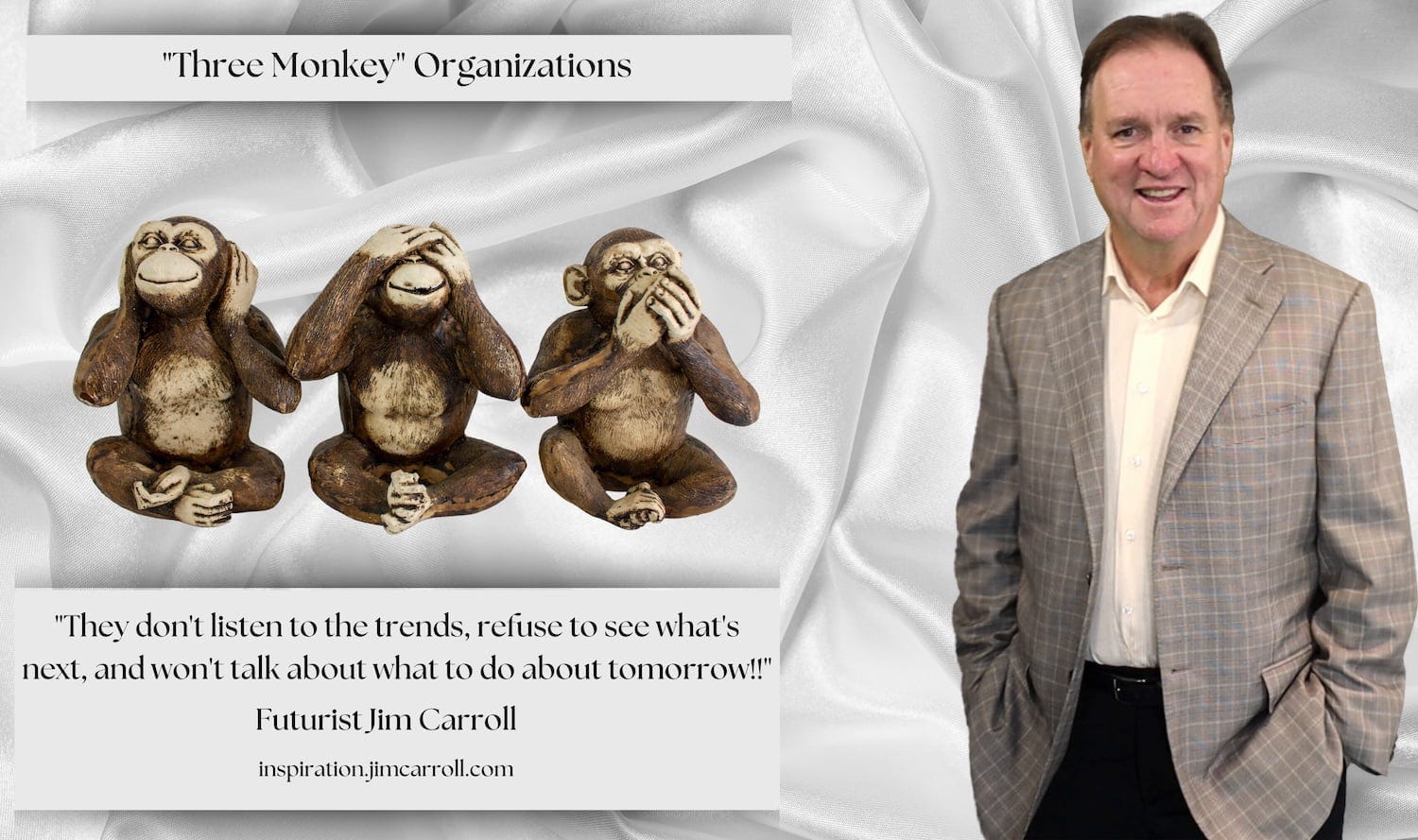"'Three Monkey Organizations' - They don't listen to the trends, refuse to see what's next, and won't talk about what to do about tomorrow!!" - Futurist Jim Carroll

I've met a lot of organizations with teams that have been led by three monkeys.
Why is this? It has been said there are three types of people in the world: those who make things happen, those who watch things happen, and those who say, “What happened?” And in fact, I’ve encountered many organizations through the years that have sat back after some sort of dramatic, earth-shaking change and asked, “What happened?” In other cases, they have been affected by slow and gradual change, yet have failed to adapt to the new circumstances which surround them.
All of them seem to share what I call the Three Monkeys’ Approach to Leadership: it is best if the organization sees no evil, hears no evil, and speaks no evil. It’s best if they are kept in the dark, focusing on today and not worrying about tomorrow. It's best if they don't listen to the drumbeat of change around them, watching for signs of disruption and upheaval. And it is critical that they dare not speak of any business model uncertainty, as that might rock the boat!
What happens with this type of corporate culture? The organization develops a keen sense of future blindness; and they are the ones that sit back in shock, after the fact, when rapid innovation and change have decimated their marketplace and industry. "Whoah, what happened?"
Nowhere has this future-blindness capability been more tuned to perfection than over two decades ago with the music industry. It remains a fascinating case study in which an entire industry adopted the Three Monkeys’ approach to the future. All the signs indicated rapid market and innovation turmoil: customers were revolting against the business model, sales were plummeting and the media was scathing in its condemnation of music industry executives for refusing to recognize their industry was in dire trouble and in need of significant change.
Yet music industry executives preferred to remain blind to the trends enveloping their industry. No one seemed prepared to talk about the reality that the global innovation feedback loop meant there would soon be a flood of small little devices allowing people to carry around thousands of songs. No one dared listen to the customer to learn that an entire generation was rejecting the idea of buying music on shiny little round discs called CDs. No one dared confront the reality that the very value of a music album had declined precipitously in the mind of the customer as online music swapping took off. No one dared to conceive that the future would be all about streaming and no longer about 'buying' music.
The entire attitude of the industry was one of “we dare not speak the truth”—and look what happened to them.
Consider this type of corporate culture now in the context of the coming tsunami of AI-driven change. Although there is a lot wrong with the wave of technology that is coming at us, there is the opportunity to do a lot of things right. Those who learn to 'tame the algorithm' and use it to a competitive advantage over their Three Money competitors will be the ones who come out on top.
Because right now, there are a lot of companies and leadership teams with a mindset and corporate culture based on the three monkeys' style of leadership.
Futurist Jim Carroll has seen a lot of 'interesting' leadership teams over the years. He remains mystified to this day.
Thank you for reading Jim Carroll's Daily Inspiration. This post is public so feel free to share it.

